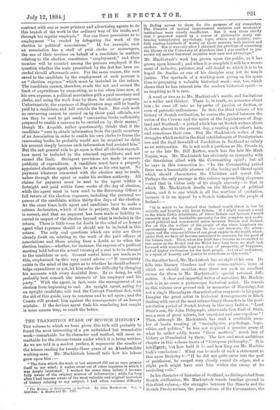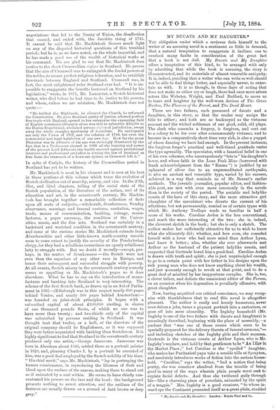THE TRANSITION STAGE OF SCOTCH HISTORY.* Tux volume to which
we have given this title will probably be found the most interesting of a yet unfinished but remarkable work—remarkable for its character and method, still more re• markable for the circumstances under which it is being written. As we are told in a modest preface, it represents the results of the leisure reading for twenty-three years of an Aberdeenshire working-man. Mr. Mackintosh himself tells how his labour grew upon him :—
" The form which the work at last assumed did not at once present itself to my mind ; it rather arose out of other inquiries in which I was deeply interested. I worked for some time before I became fully aware of the original sources of information ; while for long after I had become aware of the most valuable and original materials of history relating to my subject, I had often extreme difficulty • The History of Civilisation in Scotland. By John Mackintosh. Vol. 3. Aberdeen: A. Brown and Co. 1881,
in finding access to them for the purpose of my researches. The libraries Of mutual improvement societies and mechanics' institutions were utterly insufficient. But it was there chiefly that I prepared myself by a course of philosophic study em- bracing metaphysics, psychology, logic, ethics, and politics, care- fully reading hundreds of works on these matters, both ancient and modern. Bat it was only after I obtained the privilege of consulting the library of the University of Aberdeen that I was enabled to pro- secute my special historical inquiries with ease and advantage."
Mr. Mackintosh's work has grown upon the public, as it has grown upon himself ; and when it is complete it will be a monu- ment of industry, patience, and self-denial to which it is to be hoped Dr. Smiles or one of his disciples may yet do ample justice. The spectacle of a working-man giving up his spare time to preparing a valuable historical work—one, too, which shows that he has entered into the modern historical spirit—is as inspiring as it is rare.
A word or two as to Mr. Mackintosh's merits and limitations as a writer and thinker. There is, in truth, no nonsense about him ; be runs off into no by-paths of passion or faction, or even of patriotic enthusiasm. In this, the third volume of his history of Scotch civilisation, he covers the period between the union of the Crowns and the union of the Legislatures of Eng- land and Scotland,—a period which has set Scotch writers about it, down almost to the present day, a-tearing each other's hair, and sometimes their own. But Mr. Mackintosh writes of the struggles which ended in the final establishment of Presbyterian. ism and the final downfall of Jacobitism in Scotland as calmly as an antiquarian. lie is not such a partisan as Mr. Fronde is, or as the late Dr. Hill Burton, much less the late Mr. Mark Napier, was. Mr. Mackintosh has obviously no sympathy with the fanaticism allied with the Covenanting spirit; but all he says in this connection is : "In the Covenanting period there was a lamentable absence of the loving and liberal spirit which should characterise the Christian and moral life."
Perhaps the only passage in this volume approaching eloquence —and that in virtue only of its simple sincerity—is that in which Mr. Mackintosh dwells on the blessings of political union, and it is one which is all the worthier of quotation, because it is an appeal by a Scotch historian to the people of Ireland :—
"It is much to be desired that Ireland would throw in her lot unitedly and heartily with Great Britain. If I might venture a word to the whole Celtic inhabitants of Great Britain and Ireland, I would earnestly urge the inevitable necessity for the complete and undis- puted political and commercial union between Britain and Ireland. For on this the welfare of the people of the three kingdoms un- questionably depends ; as also do the vast interests, the advan- tages, and the responsibilities of our great empire in the world, which, under God, we have all become associated to maintain for the good of the human race. Then, when the Irish have become as reconciled to this union as the Scotch and the Welsh have long been, we shall look forward with reasonable hope to a time of prosperity, of happiness, and of higher civilisation for the Irish people. Let us ail endeavour, in a spirit of honesty and justice to contribute to this result."
On the other hand, Mr. Mackintosh has no style of his own. He falls into literary blunders and airs commonplaces, some of which we should mention were there not such an excellent excuse for them in Mr. Mackintosh's special personal diffi- culties. A clear and impartial writer of narrative, Mr. Mackin- tosh is in no sense a picturesque historical artist. He travels in this volume over ground rich in memories of Macaulay, but not a single Macaulayan characterisation reappears in his pages. Imagine the great artist in historical Arrangements in Black dealing with one of the most extraordinary characters in the post- revolution period of Scotch history in this easy fashion " Lord Stair's son, Sir John Dalrymple, afterwards first Earl of Stair, was a man of great talents, but impulsive and unscrupulous " ! Then, although Mr. Mackintosh has read a creditable num- ber of books treating of " metaphysics, psychology, logic, ethics, and politics," he has not acquired a genuine grasp of what he rather oddly terms "these matters," much less of history as illuminated by them. The last and most ambitious chapter in this volume treats of " European philosophy." It is intelligent ; but how bald it is, and how limp are Mr. Mackin. tosh's conclusions ! What can be made of such a statement as this upon Berkeley ?—" If he did not quite enter into the gulf of pantheism, be surged very closely round its edges, and a slight push might have sent him within the sweep of its encircling coils."
In his character of historian of Scotland, as distinguished from Scotch civilisation, Mr. Mackintosh treads familiar ground in this third volume,—the struggles between the Stuarts and the Scotch Presbyterians, the persecutions of the Covenanters, the negotiations that led to the Treaty of Union, the disaffection that caused, and ended with, the Jacobite rising of 1745. It cannot be said that Mr. Mackintosh throws much light on any of the disputed historical questions of this troubled period ; but he is, as we have noted, on the whole impartial, and he has made a good use of the wealth of historical works at his command. We are glad to see that Mr. Mackintosh does justice to the short Cromwellian regime in Scotland. He proves that the aim of Cromwell was to extinguish the feudal powers of the nobles, to secure perfect religious toleration, and to establish free-trade between England and Scotland. Cromwell was, in fact, the most enlightened ruler Scotland ever had. " It is im- possible to exaggerate the benefits bestowed on Scotland by his legislation," wrote, in 1871, Mr. Lancaster, a Scotch historical writer, who died before he had time to do justice to his powers, and -whom, unless we are mistaken, Mr. Mackintosh does not quote :—
" He bridled the Highlands, he silenced the Church, ho reformed the Constitution. He gave Scotland purity of justice, allowed perfect free trade with England, opened to her enterprise the expanding field of English commerce (Glasgow alone was able to subscribe £56,000 to the Darien Expedition), abolished private rights of jurisdiction, swept away the whole complex machinery of feudalism. He anticipated not only the Union of 1707, and the reforms of 1748, but even the commercial and legal legislation of our own clay. How far the great Protector was in advance of his age was strikingly illustrated by the fact that in a Parliament elected in 1868 all the learning and power of the present Lord Advocate can hardly succeed against professional interests and professional prejudice in setting the law of Scotland as free from the trammels of a worn-out system as Cromwell left it."
In spite of Carlyle, the history of the Cromwellian period in Scotland has yet to be written.
Mr. Mackintosh is most in his element and is seen at his best in those portions of this volume which trace the evolution of Scotch civilisation out of anarchy, misery, and vice. In the 29th, 31st, and 32nd chapters, telling of the social state of the Scotch population, of the literature of the nation, and of its education and art, in the seventeenth century, Mr. Mackin- tosh has brought together a remarkable collection of facts upon all sorts of subjects,— witchcraft, drunkenness, Sunday observance, marriage and funeral customs, sanitation, wages, trade, means of communication, banking, coinage, manu- factures, a paper currency, the condition of the Univer- sities, music, and the fine arts. Scotland was certainly in a backward and wretched condition in the seventeenth century, and some of the curious stories Mr. Mackintosh extracts from Aberdeenshire and other little-known north-country records seem to some extent to justify the severity of the Presbyterian clergy, for they had a rebellious (sometimes an openly rebellious) laity to struggle with. But we doubt if morally—except, per- haps, in the matter of drunkenness — the Scotch were not even then the superiors of any other race in Europe, and hence their subsequent and successful struggle with poverty. At all events, Scotch misery in the seventeenth century scarcely seems so appalling in Mr. Mackintosh's pages as it does elsewhere. What he has to say on the introduction of manu- factures and banking into Scotland is very interesting. The scheme of the first Scotch bank, as drawn up in an Act of Parlia- ment in 1695—(Edinburgh was in this respect nearly 600 years behind Venice, and nearly 300 years behind Amsterdam)— was founded on joint-stock principles. It began with a subscribed capital of about £100,000 sterling, in shares of one thousand pounds Scots, of which no one was to have more than twenty ; and two-thirds only of the capital was subsbribed by persons residing in Scotland. It was thought best that twelve, or a half, of the directors of the original company should be Englishmen, as it was supposed they were better acquainted with banking than Scotchmen. It is highly significant to find that Scotland in the seventeenth century produced only one artist,—George Jamesone. Jamesone was born in Aberdeen about 1586, settled there as a portrait painter in 1620, and, pleasing Charles I. by a portrait he executed of him, was a good deal employed by the Scotch nobility of his time. " His chief merit," says Mr. Mackintosh, " lay in portraying the human countenance, in reproducing the likeness of flesh and blood upon the surface of the canvas, making them to stand out as if animated by a soul within. He seems to have chiefly con- centrated his powers on the face and the head: the background presents nothing to arrest attention, and the outlines of the features are usually drawn on a ground of dark brown or deep grey."

































 Previous page
Previous page